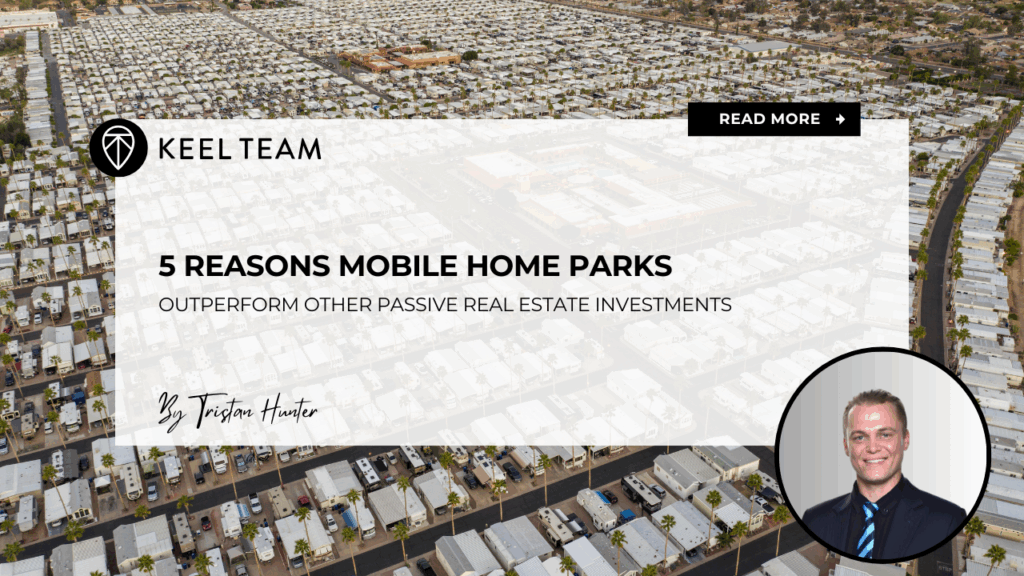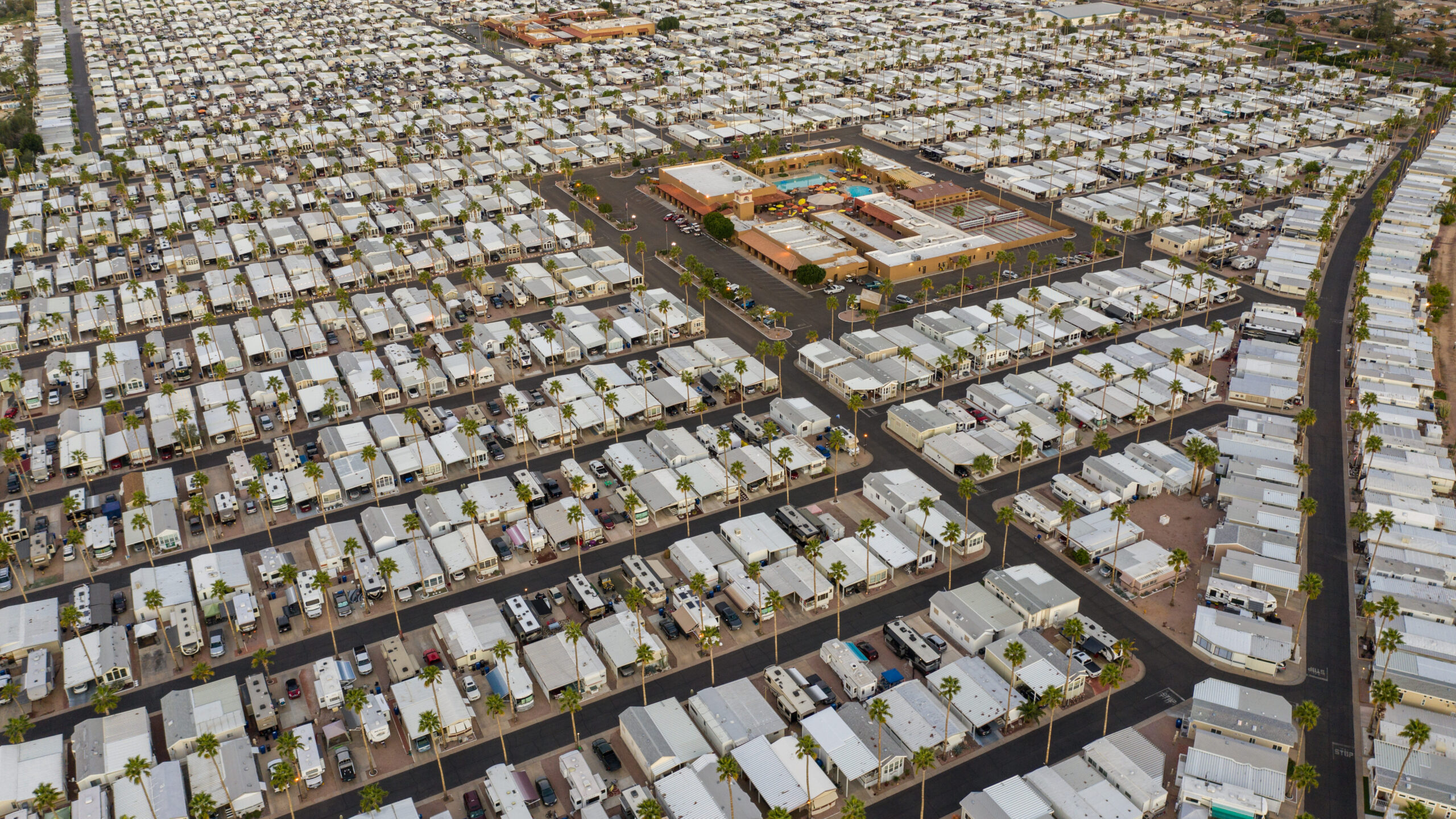5 Reasons Mobile Home Parks Outperform Other Passive Real Estate Investments
-
 Tristan Hunter - Investor Relations
Tristan Hunter - Investor Relations

Passive real estate investing offers many options, but some asset classes tend to stand out more than others. Mobile home park investing has been gaining attention among passive investors for its unique ability to combine strong returns, high occupancy, and low operating costs. While no investment is without risk, mobile home parks have certain characteristics that may allow them to outperform other passive real estate investments. Below are five reasons why many investors are drawn to this asset class.
1. High Potential Returns
Mobile home parks often deliver higher returns than other real estate types. Cap rates tend to be about 3% higher than traditional multifamily properties. This can lead to stronger cash-on-cash returns.
Some operators sell mobile home parks at cap rates between 8% and 12%, yielding over 20% in some cases. Publicly traded operators like Sun Communities have returned investors more than 4,100% since the housing crash, compared to roughly 10% for the S&P 500.
Acquisition costs are lower than other real estate options. Investors can acquire more units for far less than the cost of an equivalent apartment or single-family portfolio. Operators can also increase value quickly by billing back utilities, filling vacant lots, or raising rents modestly. These improvements can boost a property’s value by 50% to 100% in 12 to 24 months. Afterward, some investors sell, returning capital and gains faster.
Download our FREE eBook on the Top 10 things to know BEFORE investing PASSIVELY in mobile home parks!
2. Shrinking Supply Creates Long-Term Value
The number of mobile home parks in the U.S. is declining. Currently, there are around 44,000 parks, but many close or are redeveloped each year.
For instance, seven out of nine parks in one study closed due to poor conditions, with others closing for redevelopment. Over the past two decades, only a few new parks have opened, while roughly ten close annually.
Local governments rarely approve new parks. Many see them as loss leaders, costing municipal services more than the revenue they generate. Estimates suggest some municipalities lose about $20,000 per year per park.
With supply shrinking and demand high, mobile home parks may maintain long-term value and appeal to investors.
3. Strong Demand for Affordable Housing
Mobile home parks meet a critical need for affordable housing. The U.S. faces a shortage of over seven million affordable homes for extremely low-income families. Many eligible households cannot access government assistance.
Wages also drive demand. About half of Americans earn less than $30,000 per year. Renting a two-bedroom apartment requires earning roughly $22.96 per hour, far above the federal minimum wage.
By contrast, the average mobile home park lot rent is around $300 per month. This makes it far more affordable than a one-bedroom apartment ($970) or two-bedroom apartment ($1,194).
Government-subsidized housing is declining, and starter homes are harder to find. Mobile home parks offer a practical solution. High demand often means units fill quickly, with minimal marketing needed.
4. Low Tenant Turnover
Tenant turnover in mobile home parks is low, typically around 5% per year. In comparison, apartment complexes can experience 40% turnover annually.
High costs and logistics discourage residents from moving. Relocating a mobile home can cost about $4,000, and many residents live on fixed incomes or have minimal savings.
Most tenants prefer stability, reducing marketing, management, and maintenance costs. Investors enjoy more predictable cash flow and lower operational headaches.

5. Lower Repair and Maintenance Costs
Mobile home park owners usually maintain only the land and shared spaces, not individual homes. Tenants own their homes, covering interior repairs and appliances.
This structure can lower operating costs by around 20% compared to apartment complexes. Fewer expenses make it easier to manage properties remotely.
Reduced maintenance costs allow investors to focus on growth while keeping cash flow steady. Lower expenses may also enhance overall returns.
Final Thoughts
Mobile home park investing offers several characteristics that may allow it to outperform other passive real estate investments, including high potential returns, limited supply, strong demand, low turnover, and reduced maintenance expenses. These factors, combined with the ongoing affordable housing shortage, have made mobile home parks an increasingly attractive asset class for passive investors.
As with any investment, due diligence is critical. Investors should carefully evaluate the experience of the operator, the location and condition of the property, and the market dynamics in the area. By understanding the unique advantages and risks, passive investors can determine whether mobile home park investing aligns with their goals.
Are you looking for MORE information? Book a 1-on-1 consultation with Andrew Keel to discuss:
- A mobile home park deal review
- Due diligence questions
- How to raise capital from investors
- Mistakes to avoid, and more!
Disclaimer:
The information provided is for informational purposes only and is not investment advice or a guarantee of any kind. We do not guarantee profitability. Make investment decisions based on your research and consult registered financial and legal professionals. We are not registered financial or legal professionals and do not provide personalized investment recommendations.

Tristan Hunter - Investor Relations
View The Previous or Next Post
Subscribe Below 👇





